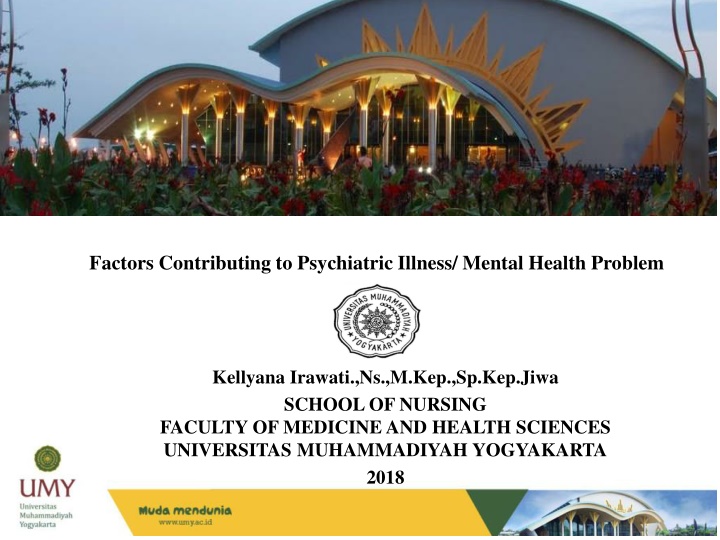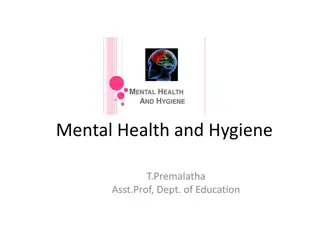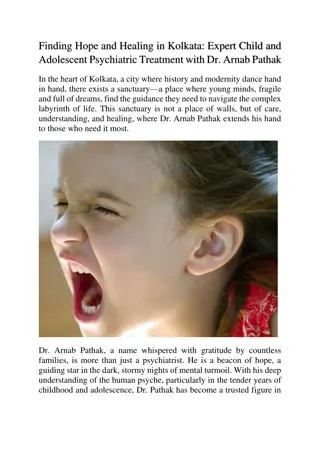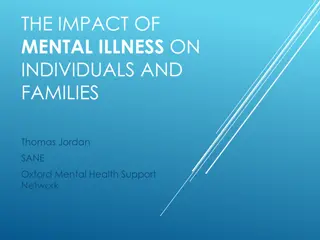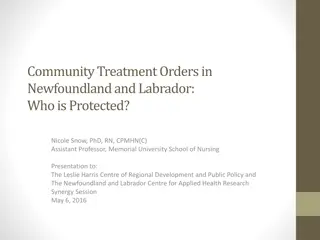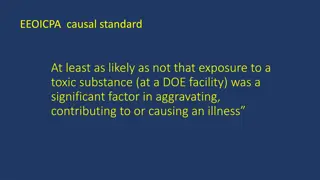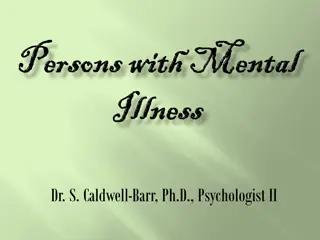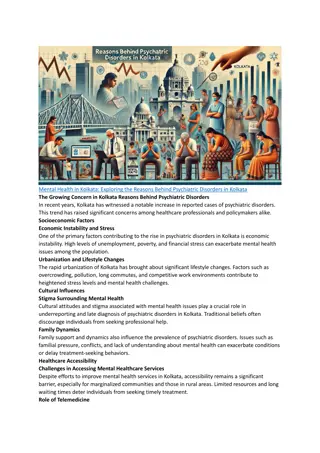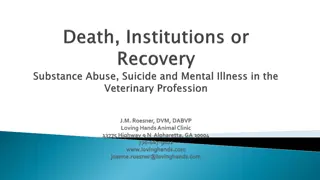Factors Contributing to Psychiatric Illness and Mental Health Issues
Factors contributing to psychiatric illness and mental health problems include predisposing factors such as psychological and biological factors, as well as precipitating stressors like challenging stimuli. Mental health is defined as a state of well-being involving happiness, contentment, and effective coping with life stresses. Criteria for mental health include positive self-attitude, growth, reality perception, environmental mastery, and autonomy. Mental illness is characterized by behavioral patterns causing distress and impaired functioning.
Download Presentation

Please find below an Image/Link to download the presentation.
The content on the website is provided AS IS for your information and personal use only. It may not be sold, licensed, or shared on other websites without obtaining consent from the author.If you encounter any issues during the download, it is possible that the publisher has removed the file from their server.
You are allowed to download the files provided on this website for personal or commercial use, subject to the condition that they are used lawfully. All files are the property of their respective owners.
The content on the website is provided AS IS for your information and personal use only. It may not be sold, licensed, or shared on other websites without obtaining consent from the author.
E N D
Presentation Transcript
Factors Contributing to Psychiatric Illness/ Mental Health Problem Kellyana Irawati.,Ns.,M.Kep.,Sp.Kep.Jiwa SCHOOL OF NURSING FACULTY OF MEDICINE AND HEALTH SCIENCES UNIVERSITAS MUHAMMADIYAH YOGYAKARTA 2018
Mental Health Mental health is a state of well-being associated with happiness, contentment, satisfaction, achievement, optimism, or hope. Mental health also relate to particular person and life situation (Stuart, 2013). Mental health is define as a state of well-being in which every individual realizes his or her own potential, can cope with the normal stresses of life, can work productively, and also able to make a contribution to her or his community (WHO, 2017)
Criteria of Mental Health Mental Health The Six Criteria are indicators of Mental Health Positive Attitude Toward Self: an acceptance of oneself and self awareness Growth, Self actualization and resilience Reality perception Integration Environmental Mastery Autonomy
Definition Mental Illness Mental Illness is a behavioural or psychological pattern demonstrated by an individual that causes significant distress, impaired functioning , and decreased quality of life.
Factors Contributing Mental Illness Predisposing Factors Precipitating Factors
Factors Contributing Mental Illness Predisposing Factors are risk and protective factors that influence the type and amount of resources the person can use to handle stress Precipitating Stressor are stimuli that are challenging, threatening, or demanding to the individual.
Predisposing Factors More than 6 month from Ilness Literature review Psychological Factors Biological Factors 1. 2. 3. 4. Genetic background Nutritional Status History of mental illness Exposure of toxin: cigarete and narcotics Biological sensitivities 1. 2. 3. 4. 5. 6. 7. 8. Intelegence Verbal or communication skill Morale Personality Past experiences Self concept and motivation Psychological defences Locus of controls 5.
Predisposing Factors Sociocultural Factors Age and Gender Education: had low educational status Income and Occupation: had a low income and unemploye Social position: low social possisition Belief Social integration or relatedness Marital Status
Biological Predisposing Factors Biological Predisposing Factors Nutrition Status: Baby with history of Malnutrition, Premature, ect Genetic: family with mental disorder/mental illness History of Mental Illness: How Long a person got the sign and Symptom of Mental Illness Exposure of Toxin: Substance Use: cigarete and oir Narcotic addistion History of Psysich Illness: diabetic, myocardial infarction, Brain cancer/tumor Biological Sensitivities
Precipitating Factors Precipitating Factors are stimuli that are challenging, threatening, or demanding to the individual Nature Biological, psychological, or Sociocultural Originate Persons internal environment Persons external environment Timing Number of stressors an individual experiences within a certain period because stressful events Number
Stuart Stress Model Adaptation Biopsychosocial Components
Key Fact about Mental Illness Almost one-fourth of all adult stays in general hospitals involves mental or substance use disorder Overall Half of all lifetime cases of mental and substance use disorder begin by age 14 and three- fourth by age 24 People with seriouse mental illness have shortened life spans, living on average only until 53 years of age.
WHO (2018) Fact on Mental Health There are indications that for each adult who died of suicide 75% of suicide occure in low- and-middle income countries Over 800.000 people die due to suicide every year and suicide is the second leading cause of death in 15-29-year- olds. Mental disorder and harmful use of alcohol
